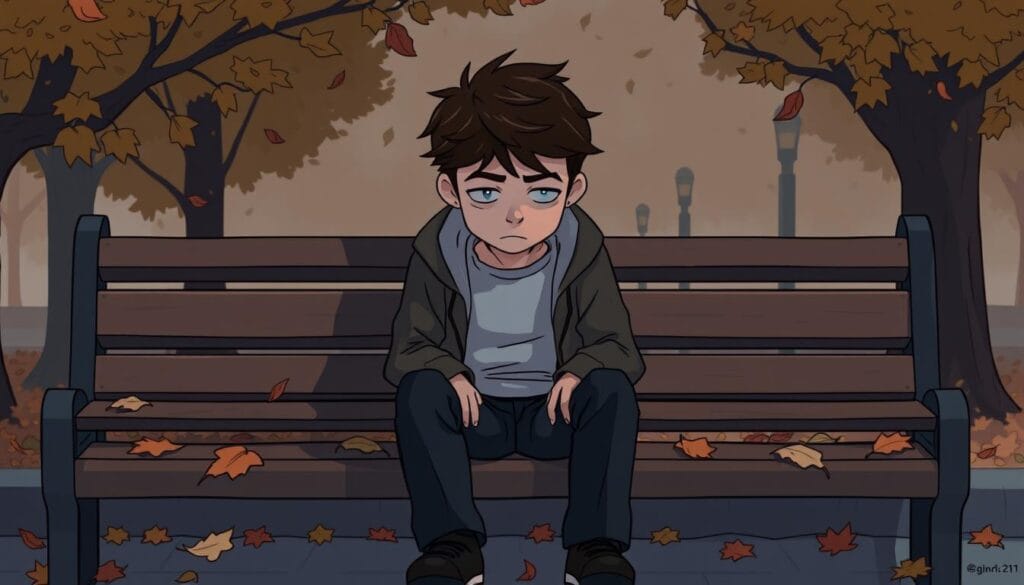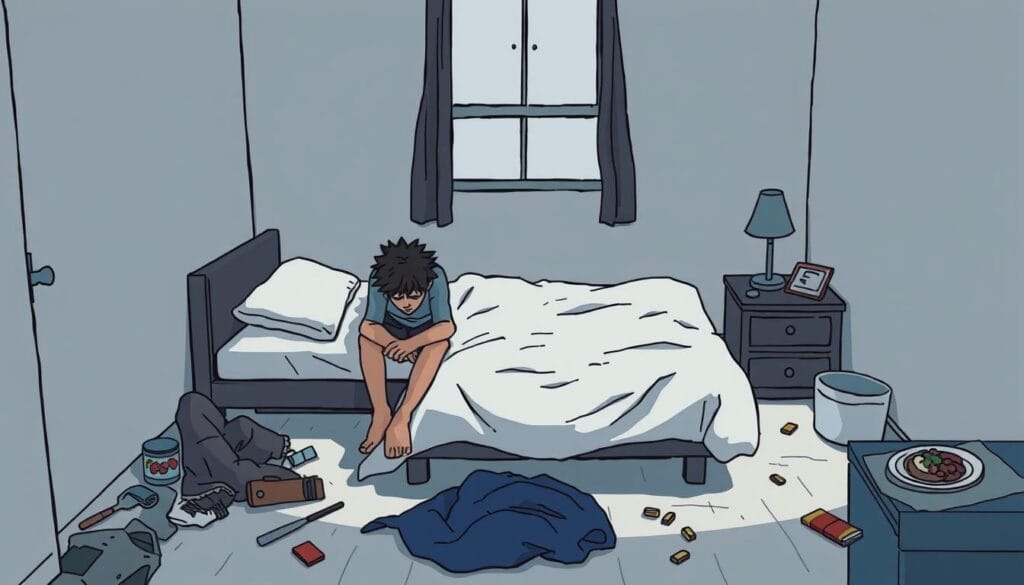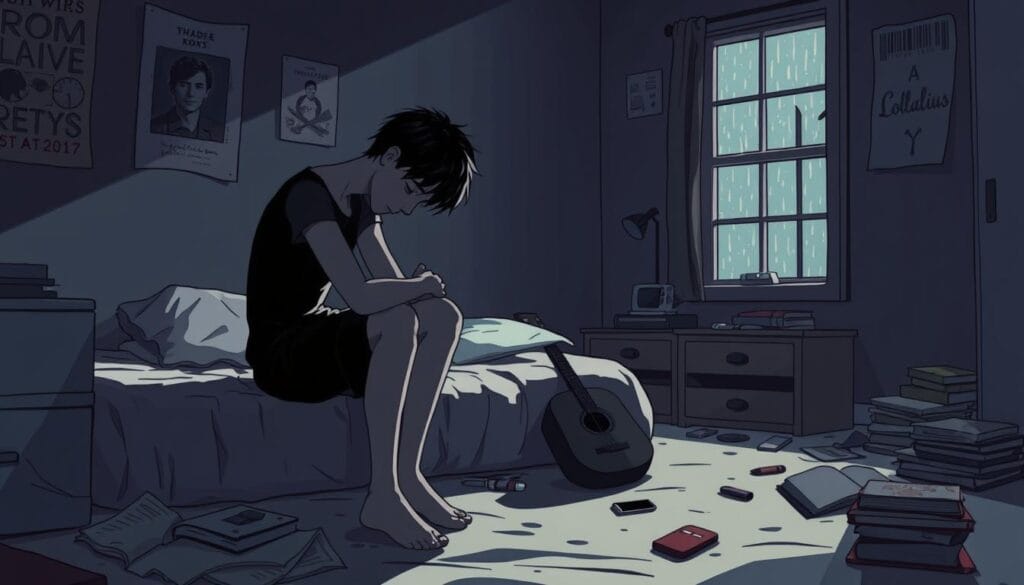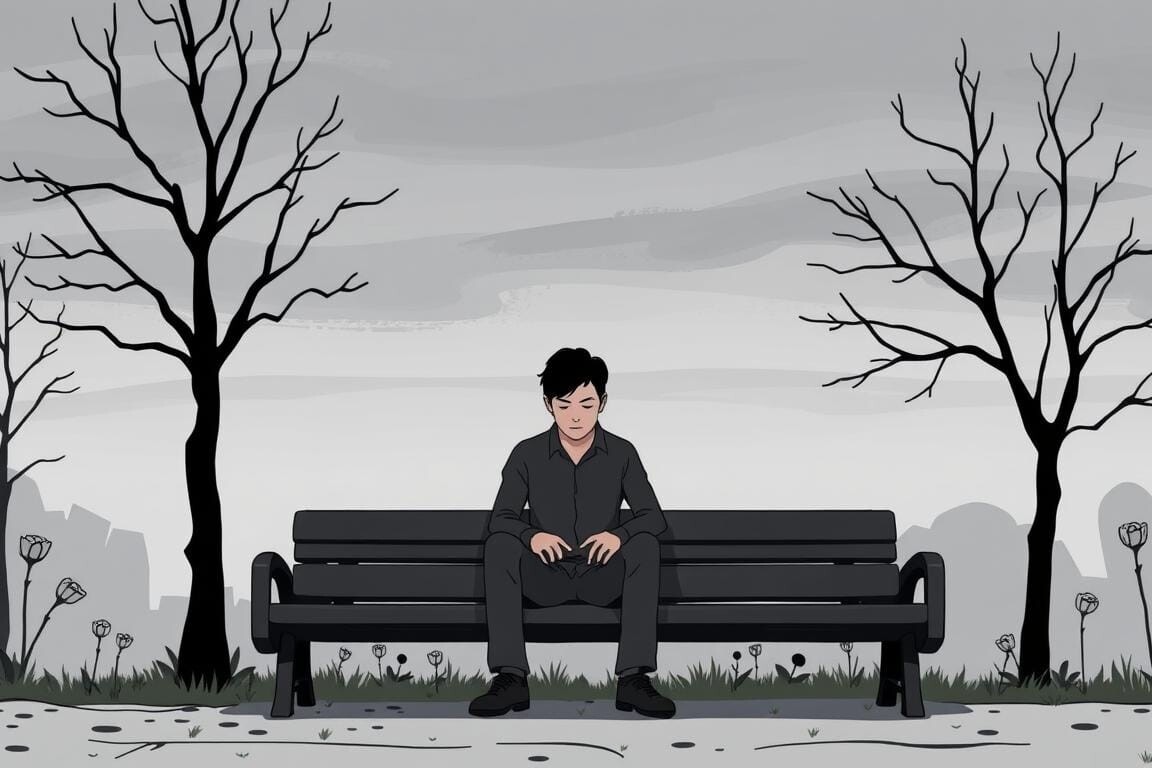Depression affects about 10% of men under 25. Dr. Chandril Chugh is a leading expert in mental health. He shares important insights on this topic.
It’s key to know the signs and risks of depression in young men. This helps us offer support and help them sooner.
Depression can deeply affect young men’s lives. It can harm their well-being, relationships, and quality of life. Knowing the signs helps us take action to improve mental health.
Dr. Chugh’s guidance is crucial. He helps us spot the warning signs of depression in young men.
With the right help, young men can beat depression. They can get back their mental health. Let’s dive into the knowledge and strategies to help them.
Table of Contents
ToggleUnderstanding Depression in Young Men
Prevalence and Impact
Depression is a complex mental health issue. It affects a person’s mood, thoughts, and actions. In young men, it can show as sadness, loss of interest, sleep and appetite changes, and feeling worthless or guilty.
Studies show that about 10% of men under 25 have depression. This is more than many think. Depression can harm personal and work life, and overall health.
The National Alliance of Mental Illness says 1 in 8 men will get depression. Sadly, 7 men die by suicide every day in Australia because of it. Getting help is hard for men, but it’s key to stop depression from getting worse.
It’s important to know how common and serious depression is in young men. There are treatments available. Getting professional help is crucial, not trying to handle it alone.

Common Risk Factors
Understanding depression in young men is key. We must know the common risk factors. These include biological, environmental, and social factors.
A genetic predisposition to depression is a big risk. People with a family history of depression are more likely to get it. Hormonal changes, especially during big life events, can also trigger depression.
Environmental and social factors are also important. Stressful life events like losing a loved one or facing career pressure can increase risk. Not having strong social support can also make it worse.
Other factors that may raise the risk of depression in young men include:
- Substance abuse, like drinking too much or using drugs
- Trauma, like physical, emotional, or sexual abuse
- Chronic medical conditions, which can affect both body and mind
Knowing these risk factors for depression in young men is vital. It helps us create better ways to prevent and treat depression. This is especially important for this vulnerable group.
Recognizing the Red Flags
Physical Symptoms
Depression in young men often shows up in physical ways. These depression symptoms in young men can be hard to spot. They might sleep too much or too little, or eat a lot more or less.
They might also feel a lot of pain or discomfort. Or they could feel really tired and weak. This can make it hard for them to do everyday things.
Spotting these physical signs of depression is key. It helps young men and their families see if they might be depressed. Then, they can get help and find ways to feel better.
- Changes in sleep patterns, such as insomnia or excessive sleeping
- Significant shifts in appetite and weight (more than 5% of body weight in a month)
- General physical discomfort or pain
- Decreased energy and fatigue impacting daily tasks

Emotional and Behavioral Changes
Depression in young men can show up in many ways, not just physical signs. It can affect their relationships, school or work, and how happy they feel. Spotting these signs is key to helping them.
Feeling sad, hopeless, or easily upset are common signs. They might also lose interest in things they used to love. These feelings can make depression even harder to deal with.
Behaviorally, they might pull away from friends, take risks, or have trouble focusing. These changes can make it hard for them to keep up in life.
It’s important to tackle these emotional and behavioral changes head-on. Recognizing them and getting help is a big step towards feeling better.

Depression is treatable, and with the right support, young men can get through it. If you see these signs in yourself or someone else, don’t wait to get help.
Depression in Young Men
Depression affects people of all ages and genders. But, young men often find it hard to talk about their feelings. This is because of what society expects from them.
There’s a big stigma around mental health. This makes it tough for young men to ask for help. We need to make a safe space for them to talk about their feelings.
Depression in men can show up in different ways. They might feel sad after losing a job or feel lonely. They might also lose interest in things they used to enjoy.
There are special types of depression that can affect young men too. These include psychotic depression and seasonal affective disorder. Things like stressful jobs, loneliness, and trauma can also play a part.
We need to watch for signs of depression in young men. By supporting them and talking openly about mental health, we can help them get better.
Seeking Professional Help
Getting help for depression in young men is key, but many face barriers. These include mental health stigma and not knowing where to find help. Young men might feel too ashamed to talk about their mental health. They worry it will make them seem weak.
Overcoming Stigma and Barriers
We need to tackle these stigmas and make it okay for young men to care for their mental health. This could mean:
- Talking more about mental health in our communities
- Offering easy-to-get and understanding mental health services
- Helping young men take charge of their mental health
Studies show men are more likely to talk about their mental health at work than in regular clinics. Talking openly about mental health in places like work and school can help. It makes it easier for young men to get the help they need.

Remember, asking for help with mental health is brave, not weak. By breaking down barriers and making resources easy to find, we can help more young men focus on their mental health. This is the first step towards feeling better.
Treatment Options
If you’re a young man with depression, you’re not alone. Over 6 million men in the U.S. face this challenge each year. There are effective treatments to help you manage your mental health and improve your well-being.
Cognitive-behavioral therapy (CBT) is a widely used and effective therapy. It helps you change negative thought patterns and behaviors that lead to depression. With a mental health professional, you can learn strategies to manage your symptoms and develop healthier coping mechanisms.
Medications like antidepressants can also help. Selective serotonin reuptake inhibitors (SSRIs) are commonly used. Examples include sertraline, paroxetine, and fluoxetine. Working closely with your doctor is key to finding the right medication and dosage for you.
In some cases, a combination of therapy and medication is best. Around 50% of individuals with moderate or severe depression are recommended this dual treatment plan. Finding the right treatment may take some trial and error, but with patience and perseverance, you can thrive.
If traditional treatments don’t work, there are emerging therapies to explore. Electroconvulsive therapy (ECT), transcranial magnetic stimulation (TMS), and psilocybin therapy show promise. These innovative approaches may help even the most treatment-resistant forms of depression.
No matter which treatment path you choose, the most important thing is to seek help. A mental health professional can guide you and help you find the right solution to manage your depression and reclaim your life.
Supportive Strategies
When dealing with depression, remember you’re not alone. There are many ways to cope and improve your mental health. Activities like regular exercise, mindfulness, and hobbies you love can help a lot.
Having a strong support system is key. This can be family, friends, or support groups. It gives you a sense of belonging, which is important for young men who might not want to ask for help. Taking charge of your well-being and finding the right resources can help you deal with depression and live a better life.
Self-Care for Mental Health
Self-care is a powerful tool for your mental health. Here are some tips:
- Regular physical activity releases happy hormones and boosts your mood.
- Try stress-reducing activities like meditation or deep breathing to handle tough emotions.
- Make sure you get enough sleep, as it’s vital for your well-being.
- Eat a balanced diet to support your body and mind.
- Drink alcohol in moderation, as too much can make depression worse.
Self-care is personal. Try different things to find what works best for you.
Accessing Support and Resources
Seeking help is a big step in managing depression. Here are some resources:
- Talk to a mental health professional for personalized help.
- Join support groups to connect with others and find community.
- Use helplines like the 988 Suicide & Crisis Lifeline for immediate help.
- Look into faith-based or community groups for mental health support.
Remember, taking care of your mental health is crucial. By using supportive strategies and resources, you can manage depression and live a happier life.
Raising Awareness and Promoting Prevention
Dealing with depression in young men needs a big effort. We must raise awareness and focus on prevention. By teaching the community about young men’s challenges, we can create a better support system.
Starting early intervention programs in schools and communities is key. Preventive interventions should match the youth’s age and needs.
- Positive youth development programs help young people grow strong and positive.
- Mental health promotion includes early childhood programs and violence prevention.
- “Wraparound” care coordination is better for kids with serious emotional needs.
By focusing on mental health awareness for young men and depression prevention, we can help. This way, young men can get the support they need for their mental health.
Improving mental health and preventing problems is key for young people. With more awareness and prevention, we can help young men succeed in life.
Conclusion
Depression in young men is a big problem that needs a full solution. We must understand their special challenges to help them. This way, we can find better ways to spot, support, and treat them.
By making mental health a priority, young men can live better lives. We need to make sure they know where to get help. And we should offer them the best ways to feel better.
It’s important to look into why depression hits young men hard. We must change how we think about who gets depressed. This means looking at symptoms that might seem different in men.
By doing this, we can help more young men get the help they need. This change could really help them feel better.
Working together, we can make a big difference in young men’s lives. We can help them feel less alone and more supported. This will make our society stronger and healthier.
We can all play a part in helping young men. By supporting them, we can make a brighter future. Together, we can tackle depression in young men and create a better tomorrow.
FAQ
What is the prevalence of depression in young men?
Depression hits about 10% of men under 25. This is a big worry for public health.
What are the common risk factors for depression in young men?
Biological factors like genes and hormones play a part. So do life stress, feeling alone, and gender norms. Substance use, trauma, and health issues also raise the risk.
What are the physical symptoms of depression in young men?
Symptoms include sleep and appetite changes, and feeling tired or uncomfortable. They might also feel unmotivated.
How does depression manifest emotionally and behaviorally in young men?
They might feel sad, hopeless, or irritable. They lose interest in things they used to like. They might pull back from friends, act recklessly, or struggle to focus.
What are the barriers young men face in seeking professional help for depression?
Societal norms make it hard for them to talk about feelings. Mental health stigma also keeps them from seeking help.
What are the available treatment options for depression in young men?
Treatments include therapy, meds, or both. Cognitive-behavioral therapy (CBT) is effective. Antidepressants can also help manage symptoms.
What are some supportive strategies that can help young men cope with depression?
Encourage healthy habits like exercise and mindfulness. Doing things they enjoy helps too. Having a strong support network is key.
How can we raise awareness and promote prevention of depression in young men?
Educate healthcare workers, teachers, and lawmakers about young men’s challenges. Early programs in schools and communities can help spot and support at-risk youth.
Source Links
About The Author

Medically reviewed by Dr. Chandril Chugh, MD, DM (Neurology)
Board-Certified Neurologist
Dr. Chandril Chugh is a U.S.-trained, board-certified neurologist with expertise in diagnosing and managing neurological disorders, including migraines, epilepsy, Parkinson’s disease, and movement disorders. His clinical focus includes evidence-based neurological care and patient education.
All content is reviewed for medical accuracy and aligned with current neurological guidelines.




